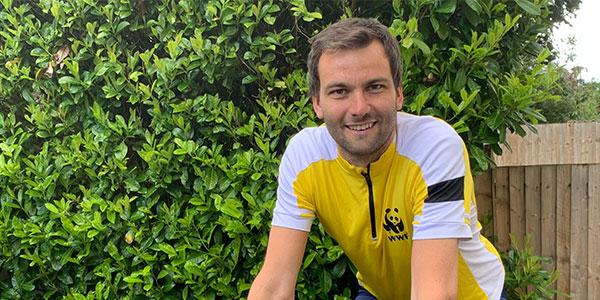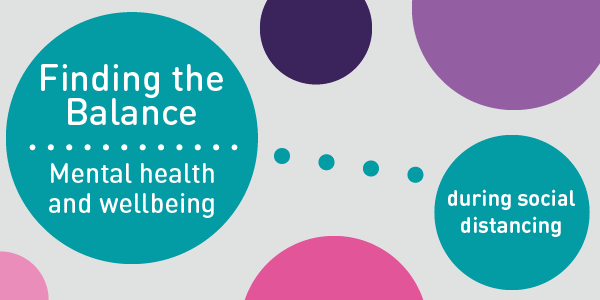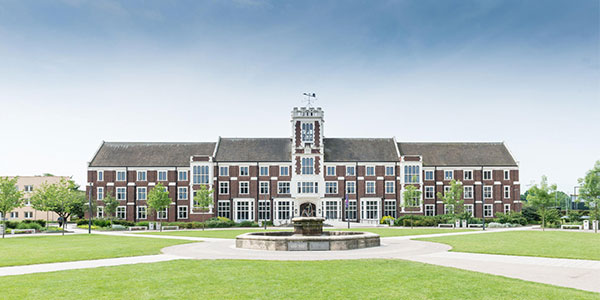| |
| |
| |
From Vice-Chancellor Bob Allison May 2020 | |
| In his May newsletter, the Vice-Chancellor reflects on some of the initiatives staff, students and alumni are undertaking to help us understand and address the impact of Covid-19 and announces the start of work on the new University Strategy. | | | |
| |
Research story of the month Whether it is the newspapers or television, we are given an almost constant stream of statistics about Coronavirus. Politicians say that they will be led by medical science and what the data tells them about the prevalence of Covid-19 in the population. Let us hope this is the case. It is not so long ago that one prominent member of the Cabinet said that the country ‘has had enough of experts’. How wrong he has been proved to be.
Of equal importance to the numbers is public perception of the pandemic. Dr Nicola Paine, Professor Paula Griffiths, and other colleagues in the School of Sport, Exercise and Health Sciences are undertaking a major piece of research into the understanding, attitudes and response of people to Coronavirus. To date the study has questioned over 35,000 individuals in 140 different countries and continues to collect data. If you or your family and friends would like to add your opinions, you can do so online.
There are some fascinating insights to report. Let me give you some examples from the UK data.
Over 80% of the population are taking exercise at least once in the last 7 days. If this could be sustained after lockdown the nation would be altogether healthier.
One part of the study looks at the behaviour of those who have contracted the illness. Of those surveyed, 86% self-isolated while they were showing symptoms of the infection. What is worrying is that the remaining 14% self-isolated for only some of the time or not at all, running a high risk of infecting others. We all know that getting the rate of infection, or R-value as it is called, down is absolutely critical to coming out of lockdown.
When asked what someone’s greatest worry was about Covid-19 it was not catching it themselves but catching and passing it on to another member of the household. The current Government advice ‘stay alert’ has received criticism because it lacks clarity. Nicola and Paula’s research suggests a stronger message might have been ‘actions are saving lives’.
This rings true for the University. As we open up our campuses and more colleagues begin to return to work perhaps our message should be ‘your actions will keep the Loughborough community safe’. I am sure that you will all want to join me in wishing Dr Paine and Professor Griffiths well with their research. | | | |
| |
| |
 | Emergency hardship appeal While the Coronavirus pandemic has brought us all many challenges, one aspect that has been really heart-warming is the way in which so many people have supported one another. Here, a few weeks ago, we launched the emergency hardship fund to raise money for students who are financially affected by Covid-19.
Thanks to the Loughborough family, we have already raised more than £85,000, with hundreds of people around the world making donations. That money will make a huge difference to the students who are struggling to cope with the impact that the pandemic is having on their lives.
As part of the initiative, several members of the Loughborough family and our alumni community, including Alumni President Oliver Sidwell (pictured above) and Pro Vice-Chancellor for Teaching, Professor Rachel Thomson, are taking part in the 130 Challenge to support the hardship appeal. Ollie, Professor Thomson and 13 other riders have been cycling 130 miles each (the distance between Loughborough and London) over the course of 15 days whilst in lockdown.
Thank you to everyone who has donated to or shared our appeal, and a very big thank you to those of you cycling to raise funds. Your kindness ensures that we can provide essential support to those students who need it most. | | | |
| |
| |
 | Your mental health and wellbeing In many of the communications that we have circulated to staff and students over the last few months, we have stressed the importance of looking after your mental health and wellbeing. This is particularly so at the moment, as we have all tried to cope with situations and circumstances so different from anything we have previously experienced.
Earlier this month we launched a new tool, the LU Wellbeing app for both staff and students, based on the NHS’s five steps to mental wellbeing initiative. Our app provides access to techniques, such as mindfulness and cognitive behavioural therapy (CBT) that can help you to make positive changes to your lifestyle, as well as guidance through podcasts and articles.
LU Wellbeing complements the existing range of mental health resources we have available to us, including The Yellow Book and the Employee Assistance Programme, which are accessible via the Staff Wellbeing website, and the University’s Health and Wellbeing blog.
We are keen to get your feedback on the range of health and wellbeing resources available, as well as your thoughts on any additional support that we could potentially provide. We have therefore launched a short survey to gather your views. If you haven’t yet done so, please spare a couple of minutes, before 19th June, to complete the survey. | | | |
| |
Government support to universities As you will have anticipated, I am doing a variety of things behind the scenes, not least to influence the Government and their support to the higher education sector in England – this is a devolved responsibility in Scotland, Wales and Northern Ireland.
I participate regularly in meetings with Universities UK and other Vice-Chancellors as we develop a strategy to place before Government on behalf of the sector as a whole. We have to recognise that the university sector is hugely diverse and a ‘one size fits all’ model does not always work in our favour.
Jane Hunt, MP for Loughborough, has been helpful in working on our behalf. Some of you may have listened to Jane’s question to the Prime Minister on Monday 11th May and the PM’s response. Let me quote Boris Johnson: ‘I know Loughborough University well. It is an outstanding university and we will work with Loughborough and across the sector to see what we can do’.
One consequence of the Prime Minister’s response to Jane Hunt’s question is that Michelle Donelan, Minister of State for Universities at the Department for Education, requested a one-to-one meeting with me which I of course accepted. I used this meeting to relay a number of messages of interventions that would be helpful to Loughborough and the wider higher education sector. The Minister has agreed to follow up on a number of issues on behalf of Loughborough and subsequently our local MP has promised to keep track of things on our behalf.
There is a range of other discussions that I am involved in, but I won’t bore you with the detail here. Suffice to say, it is all aimed at securing our position in an uncertain world.
As I make representations, the Government is making it clear that there is no blank cheque for higher education: universities are seen as self-governing. We have received some help. Universities can take advantage of the Chancellor’s furlough scheme and we have done so. The first payment of £411,000 arrived in our bank account last week but this is a fraction of the University’s wage bill and we continue to pay all of our staff 100% of their salary. We can still charge full fees if we offer satisfactory online learning provision. If this were not the case it would be catastrophic. The receipt of student fee income has been re-profiled. QR, the income that we receive based on the quality of our research, has been brought forward.
One question on everyone’s lips is which university will be the first to fail financially. Money is very tight indeed at Loughborough but I can reassure you that we continue to do things that maintain our financial sustainability. We all will need to continue to take these measures to contain and restrain costs but I remain optimistic about our future. | | | |
| |
| |
 | Next University Strategy With the approval of Council, we have started preliminary work to develop the next University Strategy. I believe that the current Strategy ‘Building Excellence’ has served us well but has just about reached the end of its life. Much has changed in higher education since Building Excellence was approved by Senate and Council almost eight years ago and we are in a very different place.
Let me provide some examples.
We have had a number of recruitment initiatives, such as Excellence 100, which has resulted in a cadre of new, highly talented colleagues, across both the Academic Schools and Professional Services. Our community of research fellows is larger than it has ever been and our research grant income is at record levels. We have opened our London campus which is already proving to be an extraordinary success. Loughborough University Science and Enterprise Park is growing at speed and we have acquired the land west of our current boundary up to junction 23 of the M1 to secure our long-term needs.
To support intakes of increasingly talented students we have undertaken a range of capital projects such as STEMLab, the West Park Teaching Hub, the refurbishment of Falkner Eggington Hall and the construction of Claudia Parsons Hall. We have the only Elite Athlete Hotel of its kind in Europe, have invested significantly in artificial playing surfaces and opened the Holywell Sport Complex. And we have not one but two national centres on our campus: The National Centre for Sport and Exercise Medicine and The National Centre for Combustion and Aerothermal Technology.
Has the University Strategy in itself delivered this extraordinary level of success? In a word: no. Our success is the product of talented, committed staff and bright, ambitious students. What the Strategy has done is provide us with a direction of travel and framework against which we have been able to make decisions and allocate resource.
So what next?
I have already held discussions with the Deans and am meeting with School Senior Management Teams to seek their advice and listen to their thoughts. It is the same with the Professional Services. The aim is to have a preliminary framework ready for a Council / Senate away-day in late September. We shall then have an extensive consultation exercise across the entire University in developing the first draft Strategy for Senate and Council to review in March 2021. By this time next year, I hope that we shall be well advanced with the final University Strategy.
I want to get as much input to our early thinking as possible. If you have any reflections on our current University Strategy or ideas for the next one would you please email them to me. | | | |
| |
And finally We are gradually re-opening our two campuses. We must do this with caution but to date we have a number of laboratories back up and running and some of our facilities are ready to start again.
We have used the Hazlerigg Building to test the University’s plans (developed by the University’s Health & Safety team) and which, incidentally, have been circulated to all UK universities as a model of good practice. These plans will allow us to open up offices in a safe way where necessary. The Hazlerigg building has been marked out with signs and tape on the floor so that a one-way system operates in corridors and on stairways to stop people getting too close together. Kitchens and toilets are occupied by only one person at any one time. Drinks are made personally. A Perspex screen has been fitted to the front desk on the ground floor.
These plans have been tested over the last week, allowing a reduced number of staff to work together effectively whilst maintaining social distancing rules. All has worked well, and the number of colleagues has been gradually increased. What we have been able to confirm is that the protocols work well, keep us all safe and allow us to start, in a very measured and careful way, returning to more normal times. Whilst the norm remains for colleagues to work from home where they can, there is now a route back to resumption of activity on campus in a safe and managed way where necessary.
Everyone returning to the campus must undertake mandatory online training. I have done so myself and it is a helpful guide to how we must behave, particularly in the company of others. To return to the research being undertaken by Professor Griffiths and Dr Paine, our actions will keep the Loughborough University community safe. | | | |
| |
| |
| |
| | | © Copyright 2020 Loughborough University This email and any files transmitted with it are confidential and intended solely for the use of the individual or entity to whom they are addressed. If you have received this email in error, please notify the sender. | |




